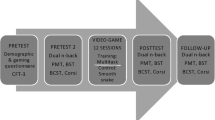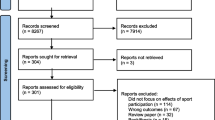Abstract
Sports betting is expanding globally through introduction into new markets and growth in existing markets. Traditionally, bets were placed on the outcome of a match before match commencement, with the outcome not determined for hours or even days. The advent of in-play betting has reduced the delay between bet and outcome. A controversial form of in-play betting is betting on micro events (micro-betting), where consumers bet on outcomes such as the next ball in cricket, or the next point in tennis, with the outcome determined almost immediately. This enables rapid, impulsive and continuous betting and may heighten the risk of problem gambling. We surveyed 1813 Australian sports bettors to determine demographic, behavioural and psychological characteristics of micro event bettors, and of those who place a higher proportion of their bets on micro events. Our two hypotheses were supported: that more highly engaged bettors, including those with gambling problems, are more likely to (1) bet on micro events, and (2) place more of their bets on micro events. Of those who bet on micro events, 78% met criteria for problem gambling, and only 5% non-problem gambling (vs 29% and 28% respectively for non micro event bettors). Placing a higher proportion of bets on micro events was also related to problem gambling. Micro event bettors were likely to: be younger, well educated and single; engaged in a wider variety of gambling activities; and to have high trait impulsivity. Micro event betting appears to appeal almost exclusively to bettors with gambling problems, so a ban would represent a highly targeted intervention to reduce gambling-related harm.
Similar content being viewed by others
Notes
Micro-betting may be the accepted term by industry, regulators and bettors, but in this paper we have used the terms “micro event betting” and “betting on micro events”. We believe that the terms “micro-bets” and “micro-betting” may be misleading as they could instead indicate small bets (like micro-transactions).
Spot-fixing is where a player stages a micro event (such as bowling an intentional no-ball in cricket), so that others can bet on that micro event for profit. Spot-fixing is easier to organise than match-fixing (where players or even whole teams conspire to lose a match) because it usually only requires a single corrupt player and is unlikely to impact the team’s overall match performance (Lastra et al. 2016).
References
Adams, P. J. (2007). Gambling, freedom and democracy. Abingdon: Taylor & Francis.
Archer, K. J., & Williams, A. A. A. (2012). L1 penalized continuation ratio models for ordinal response prediction using high-dimensional datasets. Statistics in Medicine, 31(14), 1464–1474.
Armstrong, A., & Carroll, M. (2017). Sports betting in Australia. Melbourne: Australian Gambling Research Centre. https://aifs.gov.au/agrc/publications/sports-betting-australia.
Baron, E., & Dickerson, M. (1999). Alcohol consumption and self-control of gambling behaviour. Journal of Gambling Studies, 15(1), 3–15.
Binde, P., Romild, U., & Volberg, R. A. (2017). Forms of gambling, gambling involvement and problem gambling: Evidence from a Swedish population survey. International Gambling Studies, 17(3), 490–507.
Breen, R. B., & Zimmerman, M. (2002). Rapid onset of pathological gambling in machine gamblers. Journal of Gambling Studies, 18(1), 31–43.
Breen, R. B., & Zuckerman, M. (1999). ‘Chasing’ in gambling behavior: Personality and cognitive determinants. Personality and Individual Differences, 27(6), 1097–1111.
Browne, M., Langham, E., Rawat, V., Greer, N., Li, E., Rose, J., et al. (2016). Assessing gambling-related harm in Victoria: A public health perspective. Melbourne: Victorian Responsible Gambling Foundation.
Carbonneau, R., Vitaro, F., Brendgen, M., & Tremblay, R. E. (2015). Variety of gambling activities from adolescence to age 30 and association with gambling problems: A 15-year longitudinal study of a general population sample. Addiction, 110(12), 1985–1993.
Christensen, R. H. B. (2018). Ordinal—Regression Models for Ordinal Data. https://cran.r-project.org/web/packages/ordinal/index.html.
Corp, I. B. M. (2017). IBM SPSS Statistics for Macintosh. Armonk, NY: IBM Corp.
Department of Broadband, Communications and the Digital Economy [DBCDE]. (2013). Review of the Interactive Gambling Act 2001—Final Report 2012.
Ferris, J. A., & Wynne, H. J. (2001). The Canadian Problem Gambling Index: Final Report. Ottawa: Canadian Centre on Substance Abuse.
Forrest, D., McHale, I., & McAuley, K. (2008). Risks to the integrity of sport from betting corruption. Salford: University of Salford.
Friedman, J., Hastie, T., & Tibshirani, R. (2010). Regularization paths for generalized linear models via coordinate descent. Journal of Statistical Software, 33(1), 1–22.
Gainsbury, S. M. (2014). Interactive gambling; AGRC discussion paper no 3. Australian Gambling Research Centre.
Gainsbury, S. M., Russell, A., Blaszczynski, A., & Hing, N. (2015). Greater involvement and diversity of Internet gambling as a risk factor for problem gambling. European Journal of Public Health, 25(4), 723–728.
Gainsbury, S. M., Russell, A. M. T., Hing, N., & Blaszczynski, A. (2017). Consumer engagement with and perceptions of offshore online gambling sites. New Media & Society. https://doi.org/10.1177/1461444817738783.
Global Betting And Gaming Consultants (GBGC). (2015). All to play for with in-play betting. https://www.gbgc.com/BlogRetrieve.aspx?PostID=727297&A=SearchResult&SearchID=1126426&ObjectID=727297&ObjectType=55.
Global Betting and Gaming Consultants (GBGC). (2018). GBGC global gambling report, 13th edition. https://www.gbgc.com/news/global-gambling-revenues-by-product.
Gordon, R., Gurrieri, L., & Chapman, M. (2015). Broadening an understanding of problem gambling: The lifestyle consumption community of sports betting. Journal of Business Research, 68(10), 2164–2172.
Griffiths, M. (1999). Gambling technologies: Prospects for problem gambling. Journal of Gambling Studies, 15(3), 265–283.
Harris, A., & Griffiths, M. (2018). The impact of speed of play in gambling on psychological and behavioural factors: A critical review. Journal of Gambling Studies, 34(2), 393–412.
Haw, J. (2008). Random-ratio schedules of reinforcement: The role of early wins and unreinforced trials. Journal of Gambling Issues, 21, 56–67.
Hing, N., Gainsbury, S., Blaszczynski, A., Wood, R., Lubman, D., & Russell, A. (2014). Interactive gambling. Melbourne: Gambling Research Australia.
Hing, N., Lamont, M., Fink, E., & Vitartas, P. (2015a). Sports-embedded gambling promotions: A study of exposure, sports betting intention and problem gambling amongst adults. International Journal of Mental Health and Addiction, 13(1), 115–135.
Hing, N., Lamont, M., Vitartas, P., & Fink, E. (2015b). Sports bettors’ responses to sports-embedded gambling promotions: Implications for compulsive consumption. Journal of Business Research, 68(10), 2057–2066.
Hing, N., Li, E., Vitartas, P., & Russell, A. M. T. (2018a). On the spur of the moment: Intrinsic predictors of impulse sports betting. Journal of Gambling Studies, 34(2), 413–428.
Hing, N., Russell, A. M. T., Rockloff, M. J., Browne, M., Langham, E., Li, E., et al. (2018b). Effects of wagering marketing on vulnerable adults. Melbourne: Victorian Responsible Gambling Foundation.
Hing, N., Russell, A. M. T., Vitartas, P., & Lamont, M. (2016). Demographic, behavioural and normative risk factors for gambling problems amongst sports bettors. Journal of Gambling Studies, 32(2), 625–641.
Hing, N., Vitartas, P., & Lamont, M. (2017). Understanding persuasive attributes of sports betting advertisements: A conjoint analysis of selected elements. Journal of Behavioral Addictions, 6(4), 658–668.
Hlavac, M. (2018). Stargazer: Well-formatted regression and summary statistics tables. Bratislava, Slovakia: Central European Labour Studies Institute (CELSI). https://CRAN.R-project.org/package=stargazer.
Interactive Gambling Act. (2001). Commonwealth of Australia. Retrieved from https://www.legislation.gov.au/Details/C2017C00291.
Interactive Gambling Amendment Act. (2017). Commonwealth of Australia. Retrieved from https://www.legislation.gov.au/Details/C2017A00085.
LaBrie, R. A., LaPlante, D. A., Nelson, S. E., Schumann, A., & Shaffer, H. J. (2007). Assessing the playing field: A prospective longitudinal study of internet sports gambling behavior. Journal of Gambling Studies, 23(3), 347–362.
LaPlante, D. A., Nelson, S. E., & Gray, H. M. (2014). Breadth and depth involvement: Understanding Internet gambling involvement and its relationship to gambling problems. Psychology of Addictive Behaviors, 28(2), 396–403.
LaPlante, D. A., Schumann, A., LaBrie, R. A., & Shaffer, H. J. (2008). Population trends in Internet sports gambling. Computers in Human Behavior, 24(5), 2399–2414.
Lastra, R., Bell, P., & Bond, C. (2016). Sports betting-motivated corruption in Australia: An under-studied phenomenon. International Journal of Social Science Research, 4(1), 61–82.
Linnet, J., Rømer Thomsen, K., Møller, A., & Callesen, M. B. (2010). Event frequency, excitement and desire to gamble, among pathological gamblers. International Gambling Studies, 10(2), 177–188.
Lopez-Gonzalez, H., Estévez, A., & Griffiths, M. D. (2017). Marketing and advertising online sports betting: A problem gambling perspective. Journal of Sport & Social Issues, 41(3), 256–272.
Michalczuk, R., Bowden-Jones, H., Verdejo-Garcia, A., & Clark, L. (2011). Impulsivity and cognitive distortions in pathological gamblers attending the UK National Problem Gambling Clinic: A preliminary report. Psychological Medicine, 41(12), 2625–2635.
O’Farrell, B. (2015). Review of illegal offshore wagering. Canberra: Department of Social Services, Commonwealth of Australia.
Productivity Commission. (1999). Australia’s gambling industries: Report No. 10. Canberra: AusInfo.
Productivity Commission. (2010). Gambling: Report No. 50. Canberra: Commonwealth of Australia.
Punj, G. (2011). Impulse buying and variety seeking: Similarities and differences. Journal of Business Research, 64(7), 745–748.
R Core Team. (2017). R: A language and environment for statistical computing. Vienna, Austria: R Foundation for Statistical Computing. https://www.R-project.org/.
Rodenberg, R. (2018). State-by-state sports betting bill tracker. ESPN. http://www.espn.com/chalk/story/_/id/19740480/gambling-sports-betting-bill-tracker-all-50-states. Accessed 12 June 2018.
Russell, A. M. T., Hing, N., Li, E., & Vitartas, P. (2018a). Gambling risk groups are not all the same: Risk factors amongst sports bettors. Journal of Gambling Studies. https://doi.org/10.1007/s10899-018-9765-z.
Russell, A. M. T., Langham, E., Hing, N., & Rawat, V. (2018b). Social influences on gamblers by risk group: An egocentric social network analysis. Melbourne: Victorian Responsible Gambling Foundation.
Schüll, N. D. (2012). Addiction by design: Machine gambling in Las Vegas. Princeton: Princeton University Press.
Steel, Z., & Blaszczynski, A. (1998). Impulsivity, personality disorders and pathological gambling severity. Addiction, 93(6), 895–905.
Steinberg, L., Sharp, C., Stanford, M. S., & Tharp, A. T. (2013). New tricks for an old measure: The development of the Barratt Impulsiveness Scale-Brief (BIS-Brief). Psychological Assessment, 25(1), 216–226.
The Allen Consulting Group. (2009). Review of current and future trends in interactive gambling activity and regulation. Canberra: Department of Family and Community Services, Commonwealth of Australia.
Wickham, H., Francois, R., Henry, L., & Müller, K. (2017). dplyr: A grammar of data manipulation. https://CRAN.R-project.org/package=dplyr.
Zou, H., & Hastie, T. (2005). Regularization and variable selection via the elastic net. Journal of the Royal Statistical Society: Statistical Methodology Series B, 67, 301–320.
Acknowledgements
This study was funded by internal funding from the Centre for Gambling Education and Research at Southern Cross University. The lead author was a member of this Centre at the time that the data were collected.
Funding
Alex Russell has received funding from Victorian Responsible Gambling Foundation; Queensland Justice and Attorney-General; Gambling Research Australia; National Association for Gambling Studies; Australian Communications and Media Authority and the Alberta Gambling Research Institute. He has received industry funding for an evaluation of problem gambling amongst casino employees from Echo/Star Entertainment Group. He is also affiliated with the University of Sydney. Nerilee Hing has received research funds from the Victorian Responsible Gambling Foundation, Gambling Research Australia, Australian Government Department of Social Services, Alberta Gambling Research Institute, the Australian Gambling Research Centre, the Queensland, New South Wales, Victorian and South Australian Governments, the Australian Research Council, and Australia’s National Research Organisation for Women’s Safety. She has also received consultancy funds from Echo Entertainment and Sportsbet and an honorarium from Singapore Pools for membership of its International Advisory Committee. Matthew Browne has received research funds from the Victorian Responsible Gambling Foundation, Queensland Government Department of Health, Australian Department of Social Services, New Zealand Ministry of Health, Department of Families, Housing, Community Services and Indigenous Affairs, Department of Innovation, Industry, Science and Research, Australian Department of Foreign Affairs and Trade, Japanese Ministry of Economy, Trade and Industry. Peter Vitartas has received research funds from the Queensland Department of Justice and Attorney-General and declares no conflicts of interest in relation to this manuscript. En Li has received research grants from the Victorian Responsible Gambling Foundation and Gambling Research Australia.
Author information
Authors and Affiliations
Corresponding author
Ethics declarations
Conflicts of interest
The authors declare that they have no competing interests.
Ethical approval
All procedures performed in studies involving human participants were in accordance with the ethical standards of the institutional and/or national research committee and with the 1964 Helsinki declaration and its later amendments or comparable ethical standards.
Rights and permissions
About this article
Cite this article
Russell, A.M.T., Hing, N., Browne, M. et al. Who Bets on Micro Events (Microbets) in Sports?. J Gambl Stud 35, 205–223 (2019). https://doi.org/10.1007/s10899-018-9810-y
Published:
Issue Date:
DOI: https://doi.org/10.1007/s10899-018-9810-y




